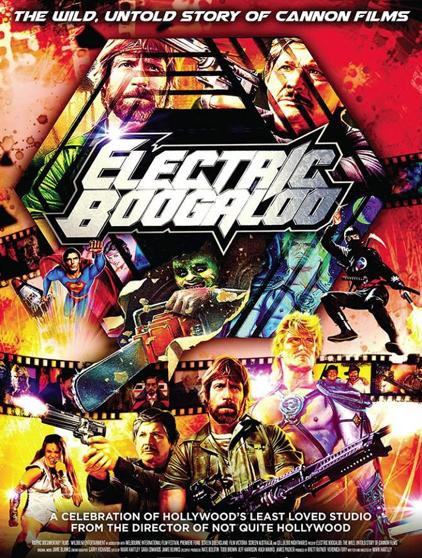The Ideological Content Analysis 30 Days Putsch:
30 Reviews in 30 Days
DAY TWENTY-ONE

Like most men who grew up in the eighties, this writer has a treasure trove of fond memories emblazoned with the immortal Cannon logo. Producers of everything from musicals and dance exploiters like The Apple (1980) and Breakin’ (1984) to science-fiction weirdies like Lifeforce (1985) and the remake Invaders from Mars (1986), the Israeli moviemaking duo of director-visionary-madman Menahem Golan and “shrewd businessman” Yoram Globus is most closely associated with a string of classic over-the-top action movies including Enter the Ninja (1981), Death Wish 3 (1985), American Ninja (1985), The Delta Force (1986), Cobra (1986), and Cyborg (1989). The wild variety of the Cannon output furnishes much of the wonder of this documentary.
Lightning-paced and packed to the gills with interviews with an array of writers, directors, actors, and editors who share with the viewer their first-hand memories of this crazy company, Electric Boogaloo is a feast of film clips, archival footage, and funny anecdotes. At a disastrous preview screening of The Apple, for example, the complimentary soundtracks provided to the audience ended up being angrily thrown and embedded in the screen! Actor Alex Winter describes director Michael Winner as “a pathologically brutal, sadistic, insecure, egotistical character” who delighted in depicting rape, while Sharon Stone “was hated on the set [of King Solomon’s Mines (1985)]. All the South Africans hated her. She took a milk bath [and] they peed in the water.” Meeting with Clyde the orangutan from Every Which Way But Loose (1978), Golan is said to have turned to his female head of publicity and asked her, “Would you fuck this monkey?” Cannon staple Charles Bronson, meanwhile, is said to have insisted on being chauffered “about three feet from his dressing room” to the set in his personal Jaguar. “It was more like watching a man golf than act.”
Cannon catapulted to prominence (if not respect) in the industry through its formula of thriftily produced exploitation, outrageous content, and pre-sales chutzpah, the end coming when the company grew too big for its britches and tried to make extravagant special effects blockbusters conceived to rival major studio output but ended up with a list of duds like Superman IV: The Quest for Peace (1987) and Masters of the Universe (1987). Responsible for products ranging from turkeys like the midget-in-a-suit chimpanzee film Going Bananas (1987) to the highly regarded Runaway Train (1985), Golan and Globus receive praise and vitriol ranging from actress Martine Beswick’s opinion that they were manipulative, “rotten and horrid”, to director Franco Zeffirelli’s assertion that they were “the best producers I ever worked for.” It is these delicious contradictions of character and clashes of larger-than-life personalities that make the story of Cannon Films such a fascinating ride.
5 stars. Highly recommended. Ideological Content Analysis indicates that Electric Boogaloo is:
3. Multiculturalist. Adolfo “Shabba-Doo” Quinones recalls with pride how the Breakin’ movies brought the races together where even the United Nations had failed.
2. Zionist, endorsing the official War on Terror narrative. “In a way, [1985’s] Invasion U.S.A. was a very prescient film,” reflects editor Daniel Loewenthal. “We didn’t really think about terrorism, the terrorism was more of an abstract idea.” In fact, Cannon had a very conscious agenda of vilifying Arabs in the American consciousness, as evidenced by the portrayals in The Delta Force. Electric Boogaloo: The Wild, Untold Story of Cannon Films alludes to these unsympathetic representations, but approaches the subject with a sense of humor rather than seriousness. Menahem Golan’s birth name was Menahem Globus (he is Yoram’s cousin), but he changed it to Golan in celebration of Israel’s occupation of Palestinian land. They are also credited with helping to popularize the Jewish supremacist term of abuse “shiksa” with American audiences in their Elliott Gould vehicle Over the Brooklyn Bridge (1984).
1. Oy vey, scratch that last one – this movie is anti-Semitic! Golan and Globus are repeatedly described in terms that reek of Jewish stereotypes. Producer Pieter Van Brugge says, “There was always that wheeling and dealing and that wheeling and dealing was very much – I mean, they were Israelis, and they were defined by that culture.” Laurene Landon, star of America 3000 (1986), excoriates: “You people have a cash register where your heart should be.” Described as being “very conservative”, both Golan and Globus thought nothing of corrupting American morals with their cultural Marxist depravity, one interviewee summarizing their winning formula as “something minus good taste”. Editor Mark Helfrich recalls of The Last American Virgin (1982), “An abortion is being played with U2 music under it, and you go from a doctor performing an abortion to some guy cutting up pizza. […] That’s insane. That’s just nuts,” he goes on, adding, “For instance, after the abortion Gary brings her a Christmas tree and a bag of oranges. That must have meant something in Israel.”
